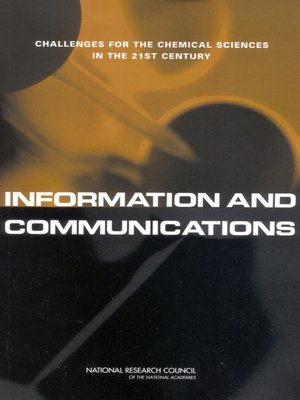Information and Communications
ebook ∣ Challenges for the Chemical Sciences in the 21st Century
By National Research Council

Sign up to save your library
With an OverDrive account, you can save your favorite libraries for at-a-glance information about availability. Find out more about OverDrive accounts.
Find this title in Libby, the library reading app by OverDrive.



Search for a digital library with this title
Title found at these libraries:
| Loading... |
<p>Since publication of the National Research Council (NRC) reports on chemistry in 1985 and chemical engineering in 1988,1,2 dramatic advances in information technology (IT) have totally changed these communities. During this period, the chemical enterprise and information technology have enjoyed both a remarkably productive and mutually supportive set of advances. These synergies sparked unprecedented growth in the capability and productivity of both fields including the definition of entirely new areas of the chemical enterprise. The chemical enterprise provided information technology with device fabrication processes, new materials, data, models, methods, and (most importantly) people. In turn, information technology provided chemical science and technology with truly remarkable and revolutionary resources for computations, communications, and data management. Indeed, computation has become the strong third component of the chemical science research and development effort, joining experiment and theory. Sustained mutual growth and interdependence of the chemical and information communities should take account of several unique aspects of the chemical sciences. These include extensive and complex databases that characterize the chemical disciplines; the importance of multiscale simulations that range from molecules to technological processes; the global economic impact of the chemical industry; and the industry's major influence on the nation's health, environment, security, and economic well-being. In planning the future of the chemical sciences and technology, it is crucial to recognize the benefits already derived from advances in information technology as well as to point the way to future benefits that will be derived.</p>






